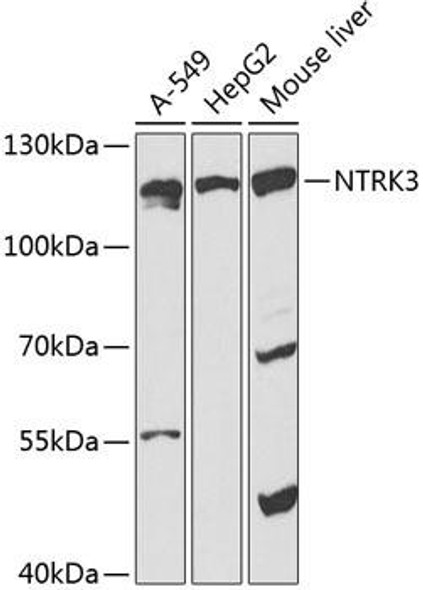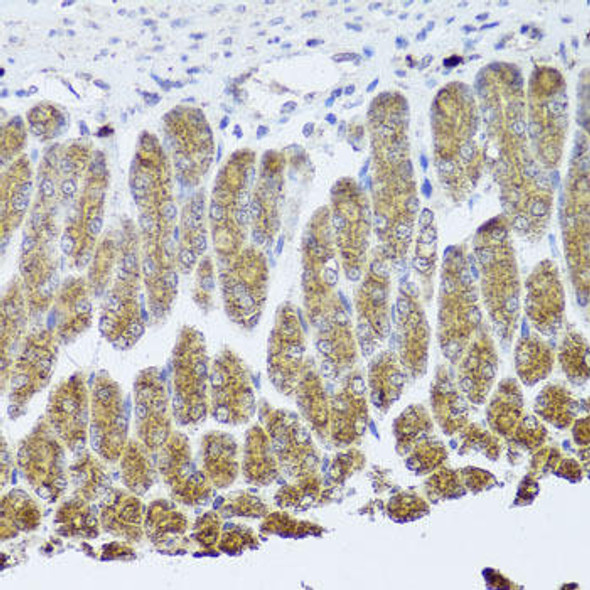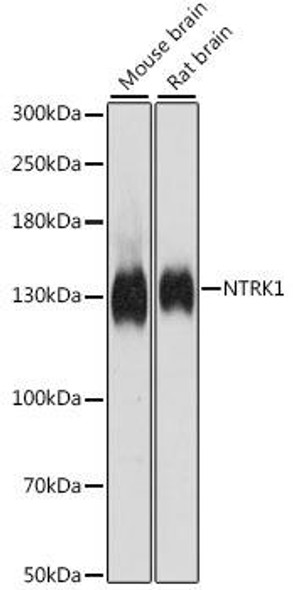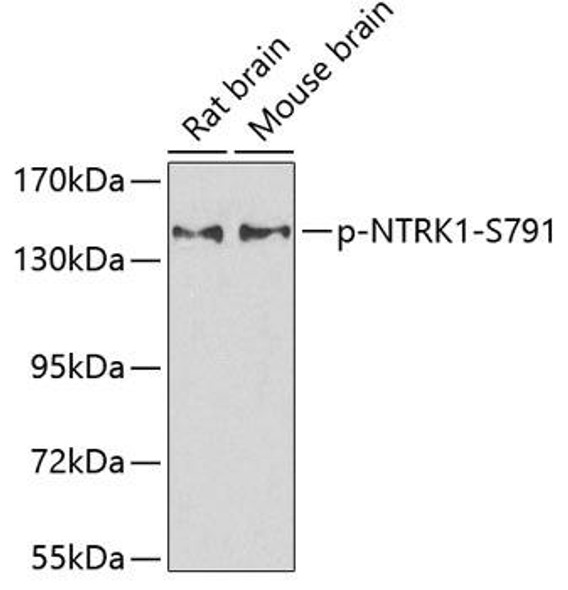Description
| Product Name: | NTRK1/NTRK2/NTRK3 Rabbit pAb |
| Product Code: | CAB18809 |
| Size: | 20uL, 50uL, 100uL |
| Applications: | WB, IF |
| Reactivity: | Human, Mouse, Rat |
| Host Species: | Rabbit |
| Immunogen: | Recombinant protein of human NTRK1/NTRK2/NTRK3. |
| Applications: | WB, IF |
| Recommended Dilutions: | WB 1:500 - 1:2000 IF 1:50 - 1:200 |
| Reactivity: | Human, Mouse, Rat |
| Positive Samples: | HeLa, HT-29, SH-SY5Y, C6 |
| Immunogen: | Recombinant protein of human NTRK1/NTRK2/NTRK3. |
| Purification Method: | Affinity purification |
| Storage: | Store at -20°C. Avoid freeze / thaw cycles. Buffer: PBS with 0.02% sodium azide, 50% glycerol, pH7.3. |
| Isotype: | IgG |
| Sequence: | Email for sequence |
| Gene ID: | 4914/4915/4916 |
| Uniprot: | P04629/Q16620/Q16288 |
| Observed MW: | 100KDa |
| UniProt Protein Function: | TrkA: a receptor tyrosine kinase of the Trk family. High affinity receptor for nerve growth factor, neurotrophin-3 and neurotrophin-4/5 but not brain- derived neurotrophic factor. Known substrates include Shc, PI-3K, and PLC-gamma-1. Has a crucial role in the development and function of the nociceptive reception system. Two splice variant isoforms have been described. |
| UniProt Protein Details: | Protein type:Protein kinase, TK; Oncoprotein; EC 2.7.10.1; Membrane protein, integral; Protein kinase, tyrosine (receptor); Kinase, protein; TK group; Trk family Chromosomal Location of Human Ortholog: 1q21-q22 Cellular Component: protein complex; cell surface; integral to plasma membrane; late endosome membrane; dendrite; early endosome; cell soma; early endosome membrane; axon; late endosome; plasma membrane; cytoplasmic vesicle; receptor complex; endosome Molecular Function:neurotrophin p75 receptor binding; neurotrophin binding; protein binding; nerve growth factor receptor activity; protein homodimerization activity; ephrin receptor binding; nerve growth factor binding; transmembrane receptor protein tyrosine kinase activity; ATP binding Biological Process: circadian rhythm; axon guidance; mechanoreceptor differentiation; peptidyl-tyrosine phosphorylation; activation of MAPKK activity; nerve growth factor receptor signaling pathway; protein amino acid autophosphorylation; positive regulation of synaptic transmission, glutamatergic; protein amino acid phosphorylation; olfactory nerve development; activation of NF-kappaB transcription factor; negative regulation of cell proliferation; sympathetic nervous system development; response to radiation; learning and/or memory; small GTPase mediated signal transduction; response to axon injury; negative regulation of neuron apoptosis; response to electrical stimulus; detection of temperature stimulus involved in sensory perception of pain; response to hydrostatic pressure; aging; response to drug; response to nutrient levels; phosphoinositide-mediated signaling; adenylate cyclase activation; Sertoli cell development; detection of mechanical stimulus involved in sensory perception of pain; positive regulation of programmed cell death; positive regulation of angiogenesis; response to ethanol; phospholipase C activation; B cell differentiation; Ras protein signal transduction; response to activity; positive regulation of Ras protein signal transduction; transmembrane receptor protein tyrosine kinase signaling pathway Disease: Thyroid Carcinoma, Familial Medullary; Insensitivity To Pain, Congenital, With Anhidrosis |
| NCBI Summary: | This gene encodes a member of the neurotrophic tyrosine kinase receptor (NTKR) family. This kinase is a membrane-bound receptor that, upon neurotrophin binding, phosphorylates itself and members of the MAPK pathway. The presence of this kinase leads to cell differentiation and may play a role in specifying sensory neuron subtypes. Mutations in this gene have been associated with congenital insensitivity to pain, anhidrosis, self-mutilating behavior, cognitive disability and cancer. Alternate transcriptional splice variants of this gene have been found, but only three have been characterized to date. [provided by RefSeq, Jul 2008] |
| UniProt Code: | P04629 |
| NCBI GenInfo Identifier: | 4585712 |
| NCBI Gene ID: | 4914 |
| NCBI Accession: | NP_002520 |
| UniProt Related Accession: | P04629 |
| Molecular Weight: | 87.511 |
| NCBI Full Name: | high affinity nerve growth factor receptor isoform 2 |
| NCBI Synonym Full Names: | neurotrophic receptor tyrosine kinase 1 |
| NCBI Official Symbol: | NTRK1 |
| NCBI Official Synonym Symbols: | MTC; TRK; TRK1; TRKA; Trk-A; p140-TrkA |
| NCBI Protein Information: | high affinity nerve growth factor receptor |
| UniProt Protein Name: | High affinity nerve growth factor receptor |
| UniProt Synonym Protein Names: | Neurotrophic tyrosine kinase receptor type 1; TRK1-transforming tyrosine kinase protein; Tropomyosin-related kinase A; Tyrosine kinase receptor; Tyrosine kinase receptor A; Trk-A; gp140trk; p140-TrkA |
| Protein Family: | Trk system potassium uptake protein |
| UniProt Gene Name: | NTRK1 |
| UniProt Entry Name: | NTRK1_HUMAN |






